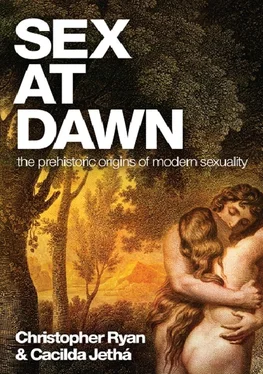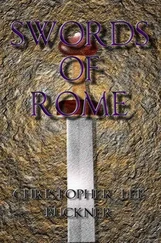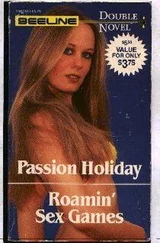Christopher Ryan - Sex at Dawn
Здесь есть возможность читать онлайн «Christopher Ryan - Sex at Dawn» весь текст электронной книги совершенно бесплатно (целиком полную версию без сокращений). В некоторых случаях можно слушать аудио, скачать через торрент в формате fb2 и присутствует краткое содержание. Жанр: Прочая научная литература, на английском языке. Описание произведения, (предисловие) а так же отзывы посетителей доступны на портале библиотеки ЛибКат.
- Название:Sex at Dawn
- Автор:
- Жанр:
- Год:неизвестен
- ISBN:нет данных
- Рейтинг книги:4 / 5. Голосов: 1
-
Избранное:Добавить в избранное
- Отзывы:
-
Ваша оценка:
- 80
- 1
- 2
- 3
- 4
- 5
Sex at Dawn: краткое содержание, описание и аннотация
Предлагаем к чтению аннотацию, описание, краткое содержание или предисловие (зависит от того, что написал сам автор книги «Sex at Dawn»). Если вы не нашли необходимую информацию о книге — напишите в комментариях, мы постараемся отыскать её.
Sex at Dawn — читать онлайн бесплатно полную книгу (весь текст) целиком
Ниже представлен текст книги, разбитый по страницам. Система сохранения места последней прочитанной страницы, позволяет с удобством читать онлайн бесплатно книгу «Sex at Dawn», без необходимости каждый раз заново искать на чём Вы остановились. Поставьте закладку, и сможете в любой момент перейти на страницу, на которой закончили чтение.
Интервал:
Закладка:
reference to Erasmus’s “ardent love of women.” She also removed “offensive” passages from The Descent of Man and Darwin’s autobiography.
Etty’s prim enthusiasm for stamping out anything sexual wasn’t limited to the written word. She waged a bizarre little war against the so-called stinkhorn mushroom (phallus ravenelii) that still pops up in the woods around the Darwin estate. Apparently, the similarity of the mushroom to the human penis was a bit much for poor Etty. As her niece (Charles’s granddaughter) recalled years later, “Aunt Etty ... armed with a basket and a pointed stick, and wearing a special hunting cloak and gloves,” would set out in search of the mushrooms. At the end of the day, Aunt Etty “burn[ed them]
in the deepest secrecy on the drawing room fire with the door locked—because of the morals of the maids.” 11
He will hold thee, when his passion shall have spent its novel force, something better than his dog, a little dearer than his horse.
ALFRED, LORD TENNYSON
Don’t get us wrong. Darwin knew plenty, and he deserves his place in the pantheon of great thinkers. If you’re a Darwin-basher looking for support, you’ll find little here. Charles Darwin was a genius and a gentleman for whom we have endless respect. But as is often the case with gentleman geniuses, he was a bit clueless when it came to women.
In questions of human sexual behavior, Darwin had little to go on other than conjecture. His own sexual experience appears to have been limited to his vehemently proper wife, Emma Wedgwood, who was also his first cousin and sister-in-law. During his circumnavigation ofthe globe on the Beagle, the young naturalist appears never to have gone ashore in search of the sexual and sensual pleasures pursued by many seafaring men ofthat era. Darwin was apparently far too inhibited for the decidedly hands-on data collection Herman Melville hinted at in his best-selling novels Typee and Omoo, or to sample the dusky South Pacific pleasures that had inspired the sexually frustrated crew of The Bounty to mutiny.
Darwin was far too buttoned-up for such carnal pursuits. His by-the-book approach to such matters is evident in his careful consideration of marriage in the abstract, before he even had any particular woman in mind. He sketched out the pros and cons in his notebook: Marry and Not Marry. On the Marry side he listed, “Children—(if it Please God)—Constant companion, (& friend in old age) who will feel interested in one,—object to be loved and played with.—Better than a dog anyhow ... female chit-chat ... but terrible loss of time.”
On the other side of the page, Darwin listed concerns such as “Freedom to go where one liked—choice of Society & little of it. ... Not forced to visit relatives & to bend in every trifle ... fatness & idleness—Anxiety & responsibility.. Perhaps my wife wont [sic] like London; then the sentence is banishment & degradation into indolent, idle fool.” 12
Though Darwin proved to be a very loving husband and father, these pros and cons of marriage suggest he very seriously considered opting for the companionship of a dog instead.
“Judging from the social habits of man as he now exists” is anything but a reliable method for understanding prehistory (though admittedly, Darwin had little else to go on). The search for clues to the distant past among the overwhelming detail of the immediate present tends to generate narratives closer to self-justifying myth than to science.
The word myth has been debased and cheapened in modern usage; it’s often used to refer to something false, a lie. But this use misses the deepest function of myth, which is to lend narrative order to apparently disconnected bits ofinformation, the way constellations group impossibly distant stars into tight, easily recognizable patterns that are simultaneously imaginary and real. Psychologists David Feinstein and Stanley Krippner explain, “Mythology is the loom on which [we] weave the raw materials of daily experience into a coherent story.” This weaving becomes tricky indeed when we mythologize about the daily experience of ancestors separated from us by twenty or thirty thousand years or more. All too often, we inadvertently weave our own experiences into the fabric of prehistory. We call this widespread tendency to project contemporary cultural proclivities into the distant past “Flintstonization” 3
Just as the Flintstones were “the modern stone-age family,” contemporary scientific speculation concerning prehistoric human life is often distorted by assumptions that seem to make perfect sense. But these assumptions can lead us far from the path to truth.
Flintstonization has two parents: a lack of solid data and the psychological need to explain, justify, and celebrate one’s own life and times. But for our purposes, Flintstonization has at least three intellectual grandfathers: Hobbes, Rousseau, and Malthus.
Thomas Hobbes (1588-1679), a lonely, frightened war refugee in Paris, was Flintstoned when he looked into the mists of prehistory and conjured miserable human lives that were “solitary, poor, nasty, brutish and short.” He conjured a
prehistory very much like the world he saw around him in seventeenth-century Europe, yet gratifyingly worse in every respect. Propelled by a very different psychological agenda, Jean-Jacques Rousseau (1712-1778) looked at the suffering and filth of European societies and thought he saw the corruption of a pristine human nature. Travelers’ tales of simple savages in the Americas fueled his romantic fantasies. The intellectual pendulum swung back toward the Hobbesian view a few decades later when Thomas Malthus (1766-1834) claimed to mathematically demonstrate that extreme poverty and its attendant desperation typify the eternal human condition. Destitution, he argued, is intrinsic to the calculus of mammalian reproduction. As long as population increases geometrically, doubling each generation (2, 4, 8, 16, 32, etc.), and farmers can increase the food supply only by adding acreage arithmetically (1, 2, 3, 4, etc.), there will never —can never —be enough for everyone. Thus, Malthus concluded that poverty is as inescapable as the wind and the rain. Nobody’s fault. Just the way it is. This conclusion was very popular with the wealthy and powerful, who were understandably eager to make sense of their good fortune and justify the suffering of the poor as an unavoidable fact of life.
Darwin’s eureka moment was a gift from two terrible Thomases and one friendly Fred: Hobbes, Malthus, and Flintstone, respectively. By articulating a detailed (albeit erroneous) description of human nature and the sorts of lives humans lived in prehistory, Hobbes and Malthus provided the intellectual context for Darwin’s theory of natural selection. Unfortunately, their thoroughly Flintstoned assumptions are fully integrated into Darwin’s thinking and persist to the present day.
The sober tones of serious science often mask the mythical nature of what we’re told about prehistory. And far too often, the myth is dysfunctional, inaccurate, and self-justifying.
Our central ambition for this book is to distinguish some of the stars from the constellations. We believe that the generally accepted myth of the origins and nature of human sexuality is not merely factually flawed, but destructive, sustaining a false sense of what it means to be a human being. This false narrative distorts our sense of our capacities and needs. It amounts to false advertising for a garment that fits almost no one. But we’re all supposed to buy and wear it anyway.
Читать дальшеИнтервал:
Закладка:
Похожие книги на «Sex at Dawn»
Представляем Вашему вниманию похожие книги на «Sex at Dawn» списком для выбора. Мы отобрали схожую по названию и смыслу литературу в надежде предоставить читателям больше вариантов отыскать новые, интересные, ещё непрочитанные произведения.
Обсуждение, отзывы о книге «Sex at Dawn» и просто собственные мнения читателей. Оставьте ваши комментарии, напишите, что Вы думаете о произведении, его смысле или главных героях. Укажите что конкретно понравилось, а что нет, и почему Вы так считаете.












